Search
To search for an exact match, type the word or phrase you want in quotation marks.
A*DESK has been offering since 2002 contents about criticism and contemporary art. A*DESK has become consolidated thanks to all those who have believed in the project, all those who have followed us, debating, participating and collaborating. Many people have collaborated with A*DESK, and continue to do so. Their efforts, knowledge and belief in the project are what make it grow internationally. At A*DESK we have also generated work for over one hundred professionals in culture, from small collaborations with reviews and classes, to more prolonged and intense collaborations.
At A*DESK we believe in the need for free and universal access to culture and knowledge. We want to carry on being independent, remaining open to more ideas and opinions. If you believe in A*DESK, we need your backing to be able to continue. You can now participate in the project by supporting it. You can choose how much you want to contribute to the project.
You can decide how much you want to bring to the project.
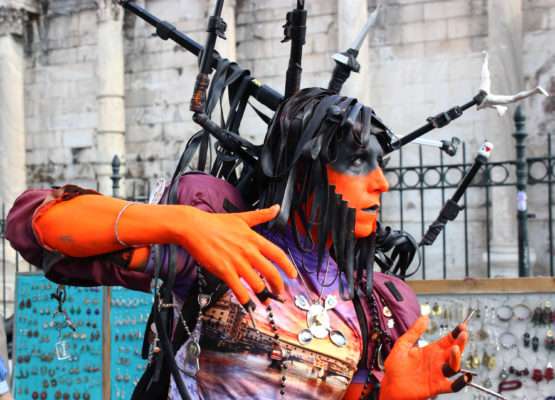
Polarization vs Antagonism
Polarization and antagonism are, in fact, socially refreshing forces. However, there is perhaps some meaning in resisting the conflation of their legacies. According to Ernesto Laclau and Chantal Mouffe’s1 fundamental views, antagonism is the ontological horizon of the social, whilst polarization pertains to a behaviorist, cybernetic mechanization of social relations. For example, the logic informing the discourse on cloud technologies, protocols, algorithms and artificial intelligence. The rise of digital communication burgeoning techno-analyses often overlook how the clashes of our era have maintained the constant digital media reprogramming while picturing those struggles as quasi-obsolete and belated. The Greek “decade of crisis” (2008-2018) showcases this pas de deux between sociopolitical antagonism and the reprogramming of the digital communication interfaces, – a certain loop between political conflict and digital outlets, reminiscent of the very modelling of the Internet after U.S. cyberwar agendas.
The uncomfortable flip-side of the virtual
ANTI, the 6th Athens Biennale sought to achieve antagonism rather than smoothen it. The title celebrated the lurky commodification of prefix ANTI in mass (digital) culture. Its self-referential banality exasperated a good number of people, especially picking on the cold labor of branding. ANTI graphics were partially developed by Metahaven, an Amsterdam based strategic design studio operating on the cutting blade between communication, aesthetics, and politics. The use of ghosted locations as venues for the biennial, such as the abandoned public telecom headquarters and the ballrooms of a looted hotel in central Athens aimed to address how online activities have a material impact on physical structures, persons, and relations. Deciding on such spaces was a sudden reversal of segmented temporality and materiality, a “back to the future” effect.
The most controversial participation in the 6th Athens Biennale challenged the irregular dynamics between digital imaging and physical, bodily insurgence: Daniel Keller and Jacob Hurwitz-Goodman’s film, documenting the activity of The Seasteading Institute for its floating islands project in French Polynesia, in fact, explores the neo-primitivism of entrepreneurial elites. In the film, the artificial-floating structures designed by the Seasteaders were visualized via spectacular 3D models, promoted to the “natives” as possible ethno-futures.

The Seasteaders. Plan b.
Another polemical participation was the —almost entirely analog— case of the Front Deutscher Äpfel, a group of German antifascists. Since 2004, they adopted the gestalt of the German right-wing extremist parties to satirize and combat the enemy. The group organized a workshop with local participants, focusing on how to challenge the role of local TV reality shows in the normalization of nationalism. In an exercise of humanitarian superiority, a few international journalists and proponents of artistic sincerity attempted to demonize the Front participation by alerting the international audience about the imminent fascist contamination of local and international visitors through encounters with the Front — dressed in black, with red armbands and banners emblazoned with an apple!
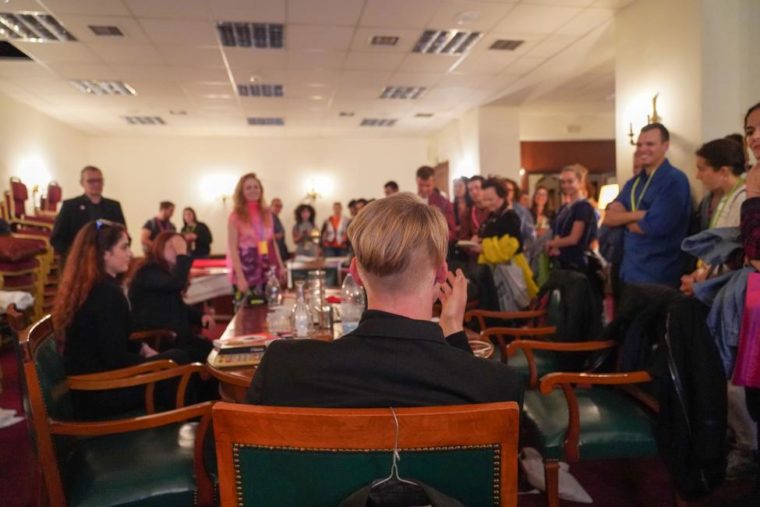
Front Deutscher Äpfel (Photo Nysos Vasilopoulos)
Antagonism as the dislocation of digital/analog architecture
The claim that post-truth confusion and misrecognition further reinforce the militarization of the digital sphere is a crypto-behaviourist truism or an obviation of art’s antagonistic potentialities. Curatorial and artistic practices can likewise reinvent the institutional extent of attention by tarnishing the digital continuum. By that, I do not simply mean digital space, but rather, the hegemonic equivalence between digital mega-structures, platforms, networks, individuals, physical and national bodies.
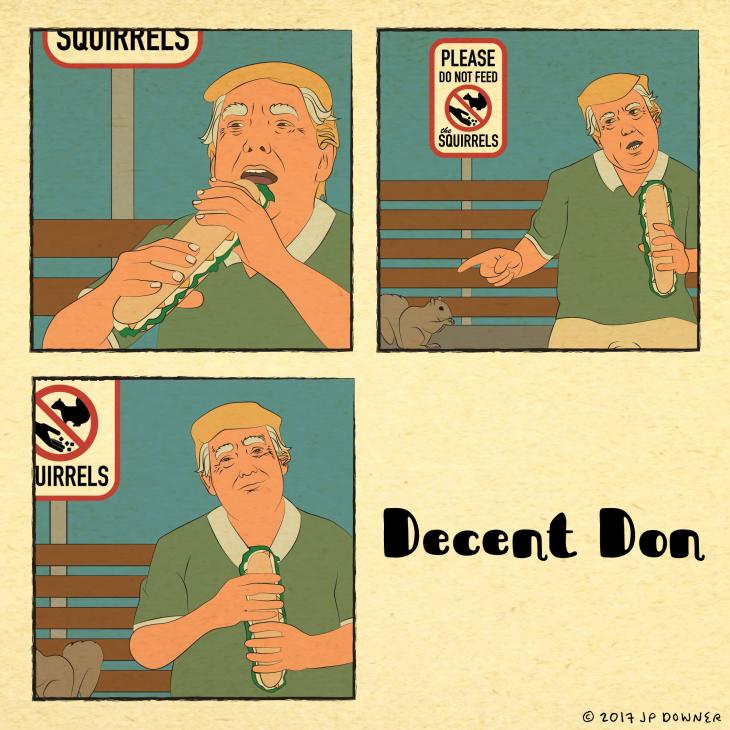
Downer Decent don project
The 6th Athens Biennale was an invitation to rethink the use-value of the post-digital WTF —What The Fuck: the lobbies of the abandoned hotel were curated in order to mimic an imaginary symposium of weird parties, merchants, clubs, and sports associations. What the hell is a post-meme comic strip —depicting Donald Trump as a decent guy— doing in a semi-derelict hotel in central Athens (this is J.P. Downer’s subliminally disturbing Decent Donseries)? Why are locals acting like a cargo cult in Panos Sklavenitis’ work? What is a taxidermic cat (Eva and Franco Mattes’ Ceiling Cat) doing over the six economists desks employed by the Peng! Collective for the Civil Financial Regulation Office?
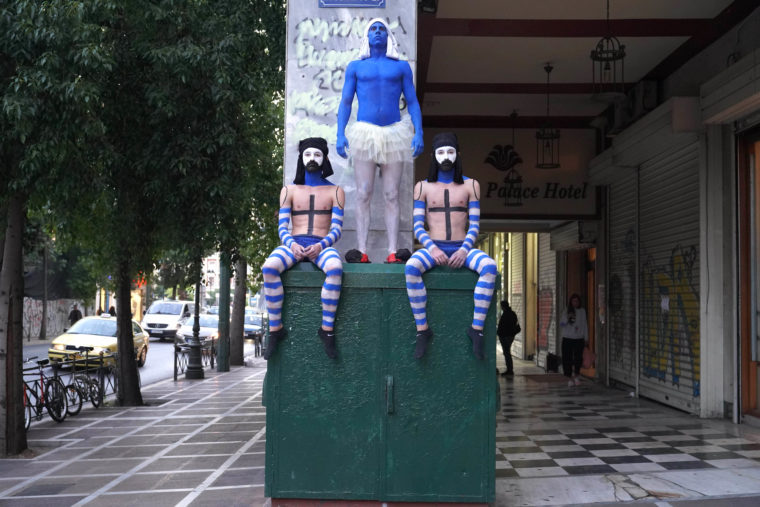
Panos Sklavenitis Cargo (Photo Nysos Vasilopoulos)

Ceiling cat Eva and Franco Mattes
To challenge post-ironic nihilism requires breaking its chain of equivalence by recalculating the affective reciprocity between things and persons. To replace this post-irony with more unsettling forms of mimesis, you have to redesign the space between digital and physical encounters, rather than calling for arbitrary sincerity and unconditional empathy.
Check AB6 on https://anti.athensbiennale.org/en
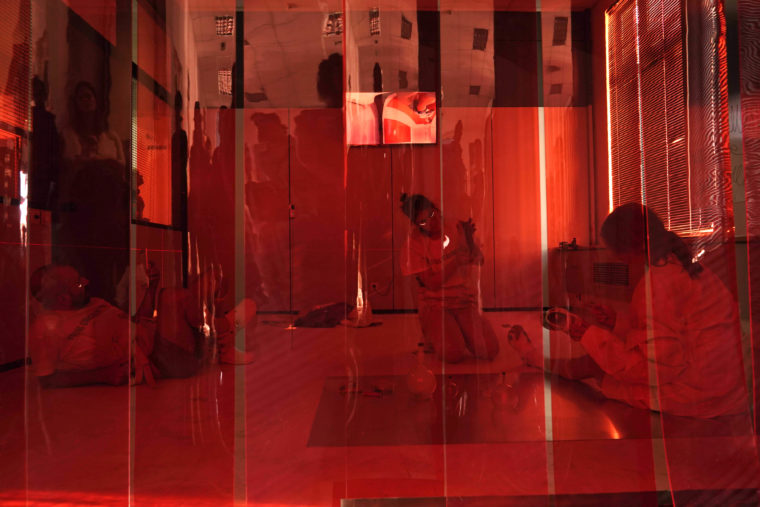
Dorota Gaweda & Egle Kulbokaite. Young Girl Reading Group (Photo Nysos Vasilopoulos)
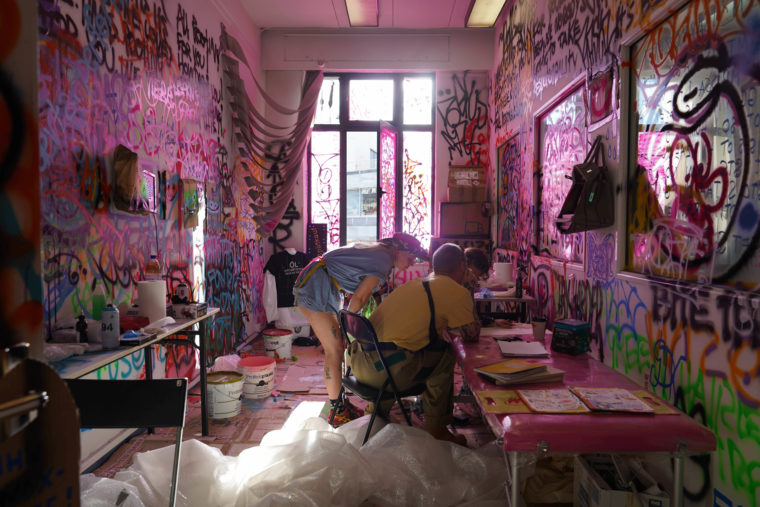
Linnea Sjoberg – Salong Flyttkartong (Photo Nysos Vasilopoulos)
(Highlighted images: Johannes Paul Raether – Schwarmesen. Photo Myrto Kyritsi)
1 Allan Deyer Hansen, A. “Laclau and Mouffe and the Ontology of Radical Negativity”, in Distinktion: Journal of Social Theory, volume 15 – issue 3, 2014, pp. 283-295.

Kostis Stafylakis is an art theorist, author and artist from Athens. Along with Stefanie Hessler and Poka-Yio, he recently co-curated ANTI, the 6th Athens Biennale. He is a member of the artistic duet KavecS (www.kavecs.com) and the curatorial and artistic band Most Mechanics Are Crooks (www.mostmechanicsarecrooks.com)
"A desk is a dangerous place from which to watch the world" (John Le Carré)